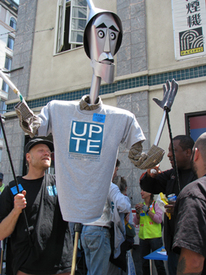
OAKLAND, Calif. — Thousands of service workers returned to their jobs on University of California campuses July 21, after a week-long strike to protest the university’s stonewalling of their demands for fair compensation in contract negotiations dragging on since last year.
The strikers, members of AFSCME Local 3299, wound up their week on the picket line with rallies June 18 in Los Angeles and at the university president’s office in Oakland. In both cities workers were joined by Democratic state legislators as well as other area unions.
Wages hold center stage. Pay as low as $10 an hour — significantly lower than at the less wealthy state universities and community colleges — forces many service workers to hold two or three jobs. Virtually all are eligible for public assistance programs.
In an action repeated on other UC campuses, the Alameda County Labor Council donated $5,000 in groceries to the UC Berkeley strikers and their families.
At the Oakland rally, state Senator Leland Yee, the Senate’s number two leader, called the poverty wages “outrageous.” Referring to over $825,000 in yearly compensation reportedly offered new UC President Mark Yudof, Yee added, “It’s wrong when administrators make six figures and you make only two.”
“You have the moral high ground here,” Assemblyman Sandre Swanson, chair of the state Assembly’s Labor and Employment Committee, told the crowd. “I used to be a custodian,” he said. “I understand what’s involved with that. We are doing this work, we add dignity to the system, they have to treat us with dignity and make sure we are all part of the same system of justice.”
As workers and their supporters gathered in Oakland, Nicolas Gutierrez, an AFSCME bargaining committee member representing UC Santa Cruz service workers, told the World the top issue is equal pay for equal work.
“When people leave eight hours at UC to go to their second job, who watches their kids?” Gutierrez asked. “Kids get in trouble when families don’t have time to spend with them.”
Some 8,500 service workers — janitors, gardeners, kitchen workers and parking attendants, among others — on UC’s 10 campuses are represented by AFSCME Local 3299, along with another 11,000 patient care technical workers covered by a separate contract. Service workers have been negotiating since last fall, patient care workers even longer.
The union said an overwhelming 97.5 percent of service workers voted in May to authorize a strike.
Claiming the union had not adequately notified it of the dates, UC got a court injunction against the strike. The union, in turn, said it had indeed notified the university in advance, and emphasized that university workers’ strikes “are allowed and legally protected by state law.” AFSCME filed a complaint with the National Labor Relations Board charging UC with illegally intimidating workers.
Yee, Swanson and other legislators promised to keep the workers’ situation in mind when the university’s budget is discussed.
Others have noted, however, that most of the workers’ pay doesn’t come from the deficit-challenged state budget. Instead, nearly 80 percent comes from the UC hospital budget, with over $371 million in profits in 2007, or from self-funded university projects.
Jennifer Early, a temporary summer worker at UC Berkeley, said she came to the Oakland rally because the university’s intimidation tactics frightened many people out of participating. “I’m out here because some people don’t have a voice,” she said. “It’s important to support unions because without them, you’ll always be scared.”
Among many campus and other unions participating were members of the University Professional and Technical Employees. Tanya Smith, UPTE Local 1’s president, said two contracts covering some 10,000 technical and research workers expired June 30.
Calling UC “not creative” in negotiations, Smith said UPTE faces similar issues in talks that started in March, with wages lagging behind comparable institutions and benefits threatened with erosion. “What happens with AFSCME workers impacts us very directly,” she said.
In Los Angeles, state legislators including Sen. Gil Cedillo (D-Los Angeles) and labor leaders including Maria Elena Durazo, head of the Los Angeles County Federation of Labor, rallied with workers to mark the last day of the strike.
mbechtel @pww.org











Comments